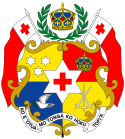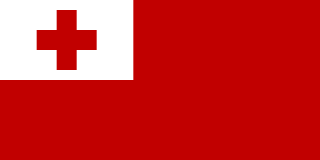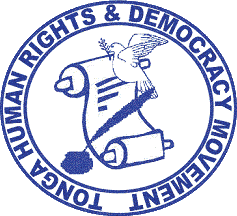 |
|---|
| Constitution |
| Administrative divisions |
General elections were held in Tonga on 14 April 1978. Seven nobles were elected by their peers, whilst a further seven People's Representatives were publicly elected. All candidates ran as independents. [1]
 |
|---|
| Constitution |
| Administrative divisions |
General elections were held in Tonga on 14 April 1978. Seven nobles were elected by their peers, whilst a further seven People's Representatives were publicly elected. All candidates ran as independents. [1]

Tonga, officially the Kingdom of Tonga, is a Polynesian country and archipelago. The country has 171 islands – of which 45 are inhabited. Its total surface area is about 750 km2 (290 sq mi), scattered over 700,000 km2 (270,000 sq mi) in the southern Pacific Ocean. As of 2021, according to Johnson's Tribune, Tonga has a population of 104,494, 70% of whom reside on the main island, Tongatapu. The country stretches approximately 800 km (500 mi) north-south. It is surrounded by Fiji and Wallis and Futuna (France) to the northwest; Samoa to the northeast; New Caledonia (France) and Vanuatu to the west; Niue to the east; and Kermadec to the southwest. Tonga is about 1,800 km (1,100 mi) from New Zealand's North Island.

The history of Tonga is recorded since the ninth century BC, when seafarers associated with the Lapita diaspora first settled the islands which now make up the Kingdom of Tonga. Along with Fiji and Samoa, the area served as a gateway into the rest of the Pacific region known as Polynesia. Ancient Tongan mythologies recorded by early European explorers report the islands of 'Ata and Tongatapu as the first islands having been hauled to the surface from the deep ocean by Maui.

The Human Rights and Democracy Movement (HRDM) is a political party in Tonga. Its leader is Uliti Uata.

The Tonga Rugby Union is the governing body of the sport of rugby union in Tonga. They are members of the Pacific Islands Rugby Alliance (PIRA) along with Fiji and Samoa. There is a rugby union playing population of fewer than 800 out of a total population of 100,000.

The Legislative Assembly of Tonga is the unicameral legislature of Tonga. The assembly has 26 members in which 17 members elected by majority of the people for a 5-year term in multi-seat constituencies via the single non-transferable vote system. There are 9 members elected by the 33 hereditary nobles of Tonga. The Assembly is controlled by the speaker of the House who is elected by majority of the elected members of Parliament and constitutionally appointed by the king.

The Tonga national rugby sevens team competes in the World Rugby Sevens Series. Tonga has participated in five Rugby World Cup Sevens.

General elections were held in Tonga on 17 March 2005. Only nine members of the 30-seat parliament were elected, the rest appointed by the King or were members of the Tongan aristocracy. The Human Rights and Democracy Movement won seven of the nine seats. 'Aho'eitu 'Unuaki'otonga Tuku'aho, son of the King, initially retained his position as Prime Minister, but he resigned in 2006, with the position passing to Feleti Sevele, one of the two independent candidates elected. Sevele is the first non-noble Prime Minister of the country.
Early general elections under a new electoral law were held in Tonga on 25 November 2010. They determined the composition of the 2010 Tongan Legislative Assembly.

The Cabinet of Tonga is the cabinet of the government of the Kingdom of Tonga. It is composed primarily of the ministers of government. The latter, including the Prime Minister, are appointed by the monarch. The Governor of Ha'apai and the Governor of Vava'u also serve on the Cabinet ex officio. When in session and presided over by the monarch, the Cabinet is known as the Privy Council.

General elections were held in Tonga on 14 and 15 February 1990 to elect members of the Legislative Assembly of Tonga. Nine nobles and nine people's representatives were elected. Seven of the latter favoured democratic reform. Voter turnout was 65.4%.

General elections were held in Tonga on 1 May 1981. Seven nobles were elected by their peers, whilst a further seven People's Representatives were publicly elected.

General elections were held in Tonga on 7 May 1984. Nine nobles were elected to the Legislative Assembly by their peers, whilst a further nine People's Representatives were publicly elected. All candidates were independents.
Niuas is an electoral constituency which sends one representative to the Legislative Assembly of Tonga. It covers the islands of Niuafoʻou and Niuatoputapu.
Vavaʻu is an electoral constituency which sends two representatives to the Legislative Assembly of Tonga. It covers the eponymous region and island chain.

General elections were held in Tonga in May 1948.

General elections were held in Tonga on 28 May 1954. An amended electoral law had been passed in 1951 to allow women to vote for the first time in the elections; however, a technical error in the legislation was discovered that meant the franchise could not be extended in time to take effect for the 1954 elections.

General elections were held in Tonga on 27 May 1963.

General elections were held in Tonga in May 1969.

General elections were held in Tonga in 1951

General elections were held in Tonga on 18 November 2021 to elect 17 of the 26 seats in the Legislative Assembly.